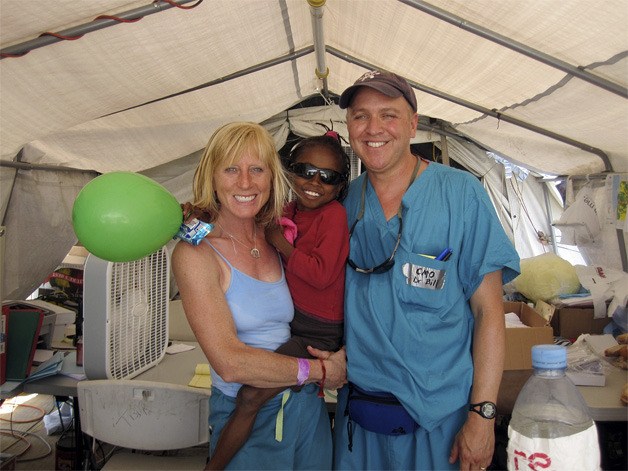Bill and C.C. Crenshaw have always wanted to do some sort of relief work, but the right opportunity had never come up — until they were called to help in Haiti. On the last leg of their journey, they flew from Miami on a one-hour, 40-minute flight into another world.
They could not have imagined the suffering they saw.
“One minute you’re sipping your coffee at Starbucks, then you’re in a war zone,” C.C. said.
They soon found that stifling heat, the lack of clean water, lack of sleep and constant trauma were the daily routine.
The Crenshaws became part of the wave of help offered by individuals and relief agencies that rallied to help Haiti and its people after a 7.0 magnitude earthquake. The catastrophic Jan. 12 quake leveled the capitol city of Port-au-Prince, killing and injuring thousands, and dealt another blow to the country’s already fragile economy.
Ten-year residents of Mercer Island, the couple made the trips to Haiti this year to work with the Project Medishare, organized through the University of Miami Medical School. They were there in April and again in October, each trip for a week. On each, they hit the ground running at 6 a.m. on the Saturday morning they flew in to late the next Saturday night when they flew out.
Bill Crenshaw, a physician who specializes in interventional radiology, found out about Project Medishare from a co-worker, whose father had been in Haiti right after the quake. Project Medishare, founded in 1994, was already set up and running in Haiti before the earthquake hit.
C.C. also had a connection to Haiti; her sister, Ann Hauge, had lived in Haiti for 20 years, most recently running an import-export business. Hauge was visiting family in New York at the time of the earthquake, so she wasn’t injured; however, her business and home were a total loss. She hasn’t been back.
As the chief medical officer at the tent hospital Project Medishare set up, Bill said there was “unimaginable stress.” A majority of Haiti’s nurses were killed in the earthquake while many doctors fled the island, Bill said. It was all in a day’s work to see 300-400 patients in an hour at the clinic.
Everything was a challenge.
“Sterility was non-existent,” Bill said.
To describe what they experienced and saw is difficult for the couple, which is why they are so grateful to have shared the experience together. With the limited resources they had available, the doctors had to focus on patients who they could save rather than those they could not. Patients would be marked with an “X” or an “O” to identify who could be saved and who could not. C.C. helped to move bodies of the dead, including children who she carried in her arms.
The couple has a sort of unspoken understanding of the suffering they witnessed, which only they can comprehend.
“The fact that we both went was critical to our experience,” C.C. said.
They both agreed the Haitian people were amazing and resilient. With limited medical staff, Bill said if there was a family member who survived, they would tend to their ailing relative in the hospital at night; one family member for each patient.
The couple had high praise for the United States Army.
“They were unbelievable,” C.C. said. “They created order out of chaos.”
When the Crenshaws went back in October, the hospital in Port-au-Prince had moved from the tents to an actual hospital facility, still crude by U.S. standards. There are now 50 beds compared to 120 in the tents. There are many amputees, forced to give up a limb for their life. There is no trash collection, no sewer, and it’s hard to get clean water. Yet, the tent cities thrive. The Crenshaws said 50,000 people live in one of the tent cities that was established by actor Sean Penn, which they said is well run.
However, now a new and dangerous situation has come up. Cholera.
“The outbreak hit in St. Marcs just north of Port-au-Prince,” Bill said. “It’s a classic epidemic.”
Cholera is transmitted by contaminated water. When infection sets in, it causes severe dysentery that leads to dehydration and death. The outbreak occurred two days after they left in October, but Bill is in contact with their Project Medishare counterparts in Haiti daily, and the reports are discouraging. People lying next to each other wall to wall are covered in feces and vomit. As of Nov. 29, 1,721 people have died from cholera in Haiti.
Both the World Health Organization and the Center for Disease Control are on the ground in Haiti, but residents are rioting against the United Nations, which they blame for bringing in the cholera. Tensions are also mounting with the election of a new government turning into accusations of fraud among the 19 presidential candidates and their supporters.
What the country needs now are supplies. C.C. said the best way to help is to donate money to NGOS — to look at the Web sites of various organizations that are on the ground in Haiti, and support them financially with a cash donation, or do a shoe or clothing drive; whatever you can do.
Bill is in touch with the hospital every day. He calls a phone number in Miami, which then patches him through. He and C.C. are going back in March.
He said Medishare’s goal is to transfer the facility to Haitian doctors as soon as they are ready.
There is still a huge amount of work to do to rebuild Haiti, but thanks to the good work done by people like the Crenshaws, the people of Haiti have a chance.
How to help
To learn more or to donate, visit www.projectmedishare.org or other similar organizations, such as www.doctorswithoutborders.org and www.redcross.org.



